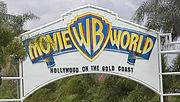Related Research Articles

Name That Tune is an American television music game show. Originally created and produced by orchestra conductor Harry Salter and his wife Roberta Semple Salter, the series features contestants competing to correctly identify songs being played by an on-stage orchestra or band.
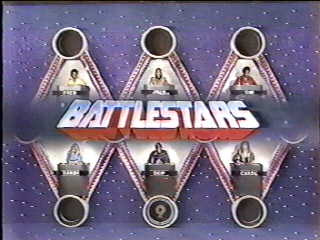
Battlestars is an American game show that aired on NBC during the 1980s. The program's concept was developed and produced by Merrill Heatter, featuring a six-celebrity panel. The object of the game is to "capture" the celebrities by lighting up numbers positioned around triangle shapes, inside of which sat each panelist. Similar to Hollywood Squares, which Heatter also co-created and produced, the celebrities are asked questions by the host, and the contestants judge the truth of their answers in order to light up the numbers.
Deal or No Deal was an Australian game show that aired on the Seven Network from 13 July 2003 to 4 October 2013. It was the first international version of the game show, after the original Miljoenenjacht from the Netherlands. It was the first of the versions to use the Deal or No Deal name. It was hosted by Andrew O'Keefe for its entire 10-year run.
Illinois Instant Riches is a lottery game show airing in the state of Illinois, as well as nationally on Chicago-based Superstation WGN-TV. The show was hosted by Mark Goodman, with Linda Kollmeyer as his co-host and Bill Barber as announcer.

Miljoenenjacht, officially Postcode Loterij Miljoenenjacht, is a Dutch game show, sponsored by the country's postcode lottery, where a contestant and at-home viewer could win up to €5,000,000 or as little as €0.01. The show is broadcast at various times, spanning across six episodes for each set. The program was originally shown by TROS on NPO 2, but moved to creator John de Mol's channel Tien in 2005. After the channel was discontinued after its sale to the RTL Group, the program moved to RTL 4. In 2019, the program moved to SBS6 due to the transfer of Linda de Mol from RTL to SBS.

Gameshow Marathon is an American television program which aired on CBS from May 31 to June 29, 2006. It is based on the United Kingdom series Ant & Dec's Gameshow Marathon which aired on ITV in 2005. It also aired in Canada on CTV.

Temptation was an Australian game show which premiered on the Nine Network on 30 May 2005 and aired at 7.00pm. Hosted by Ed Phillips and Livinia Nixon, the show was a remake of Sale of the Century, which aired on Nine in the same timeslot for more than twenty years between 1980 and 2001. Temptation had the same general format of its predecessor, but with several new features and a de-emphasis on the "shopping" aspects of the endgame. The show ran until 30 November 2007, when it was placed on hiatus by the network following strong competition from game show Deal or No Deal on the rival Seven Network; during the hiatus, Nine filled the timeslot with episodes of the American sitcom Two and a Half Men. When Ed Phillips made an appearance on The NRL Footy Show he announced "maybe summer" would be the return of the show. This statement was accurate, as Temptation returned for a shortened fourth series from 1 December 2008 with unaired episodes which were recorded during 2008. During that time, Ed Phillips was dumped by the Nine Network after his contract expired in November, and Temptation never returned to the schedule. After 23 January 2009, when the show's final episode aired, all Temptation websites were removed, and Two and a Half Men returned to Channel Nine's 7:00pm schedule.
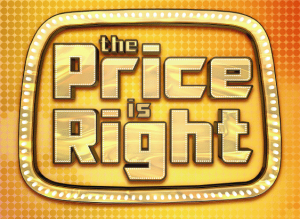
The Price Is Right is an Australian television game show that has been produced in a number of different formats, based on the American concept of the same title. The most recent of these formats began airing on 7 May 2012 on Seven Network. Larry Emdur, who hosted the program on two occasions prior to 2012, was the presenter for the 2012 revival.
Sale of the Century is an Australian game show that aired on the Nine Network from 14 July 1980 to 29 November 2001. It is based on both Great Temptation that aired from 1970 to 1974 and on the original Sale that first aired in the United States from 1969 to 1973. The Australian format of Sale has since been used internationally, including in a revived US version that aired from 1983 to 1989.

The New Zealand Lotteries Commission, trading as Lotto New Zealand since 2013, is a Crown entity that operates nationwide lotteries in New Zealand. It was established in 1987 and operates under the Gambling Act 2003. Its oldest and most popular game is Lotto, which boasts a top prize pool of NZ$4 million. Other games include the four-draws-daily Keno, the daily Bullseye, and a variety of scratchcards and online games known as Instant Kiwi. Instant Kiwi may only be played by persons 18 years of age or older, under the Gambling Act 2003. Powerball and Lotto Strike are optional extras with every Lotto ticket.
Deal or No Deal is a game show which was aired in Singapore on MediaCorp Channel 5 and MediaCorp HD5 for two seasons. Based upon the original Netherlands format of the game show, each episode sees a contestant choosing one of 26 briefcases, each containing a cash amount between $1 and $250,000, and then attempting to win as much as possible either by gambling on having a high amount in their chosen briefcase, or making the game's hidden operator, named "the Banker", offer a considerable cash sum for their case regardless of what is inside. The amount a contestant wins is determined by pure luck – cash amounts are randomly allocated to each of the briefcases before each game, with contestants required to open a specific number of briefcases per round of the game to eliminate the cash amounts their chosen briefcase does not contain, in turn affecting how much is offered by the Banker.
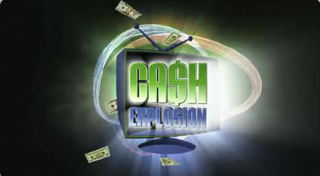
Cash Explosion, known as Cash Explosion: Double Play from 1989 until 2012, is the official Ohio Lottery TV game show, which is broadcast on television stations throughout Ohio. The show originated in Cleveland and is now taped by Mills James Productions in Columbus, Ohio.
La ruleta de la fortuna or La ruleta de la suerte is the Spanish version of Wheel of Fortune. The first incarnation ran from 1990 to 1992 in Antena 3, the second one from 1993 to 1997 in Telecinco, and then, after a nine-year hiatus, a revival has been made on Antena 3 beginning in 2006. The show also airs internationally via Antena 3 Internacional.

Bingo America is an American game show broadcast by Game Show Network. The series follows two contestants as they try to compete to win up to $100,000. Additionally, the series lets at-home viewers print bingo cards online that allow them to play along with the show to win small amounts of money for themselves.
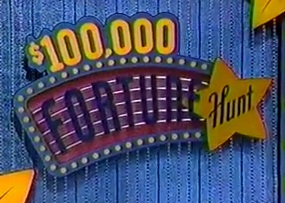
100,000 Fortune Hunt is an American lottery-based game show originating in the state of Illinois. It debuted on September 16, 1989, and aired on Saturday evenings from 1989 to 1994 on WGN-TV in Chicago ; it was also broadcast on WGN's national satellite feed. Jeff Coopwood hosted the first season, with the rest of the run being hosted by Mike Jackson. Linda Kollmeyer served as the hostess during the entire run with Bill Barber as the announcer.
La Poule aux œufs d'or is the title of two different Canadian television game shows broadcast during two different periods.
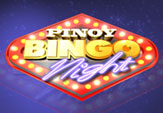
Pinoy Bingo Night is the Philippine game show version of National Bingo Night, which premiered on the ABS-CBN from March 30 to June 26, 2009. It is hosted by Kris Aquino with Brod Pete as the "bingo caller" and Mel Feliciano as the "commissioner", who referees the playing studio audience.

Late Night Liars is an American television game show on Game Show Network (GSN) that was under The Jim Henson Company's Henson Alternative brand and premiered on June 10, 2010. The series was hosted by Larry Miller, and stars several "celebrity" puppets, which were created by The Jim Henson Company. Each episode has two human contestants trying to figure out which of the puppets are lying, and which are telling the truth.
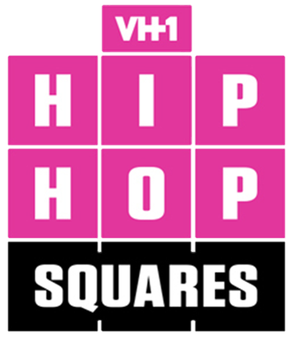
Hip Hop Squares is an American television game show originally hosted by Peter Rosenberg, which debuted on MTV2 on May 22, 2012. The show is a licensed format of CBS Television Distribution's Hollywood Squares featuring mostly rappers. The MTV2 version of the show was taped in Brooklyn, New York. The VH1 version was taped in Hollywood, California.

The Chase Australia is an Australian television quiz show based on the British program of the same name. It is broadcast on the Seven Network and premiered on 14 September 2015. Four contestants play against an opponent, known as the "chaser", who plays for the bank. The show was originally hosted by Andrew O'Keefe until July 2021, when he was replaced by Larry Emdur. The series began with Brydon Coverdale, Anne Hegerty, Matt Parkinson and Issa Schultz as chasers, with Mark Labbett joining in 2016. Shaun Wallace appeared as a guest chaser in 2018, and Cheryl Toh has appeared as a chaser since 2019. Mara Lejins joined as a chaser in 2022.
References
- ↑ Pilling, Melanie (1 February 2001). "Larry reaps his reward". Gold Coast Bulletin . p. T11. Retrieved 27 October 2021.
- 1 2 Hood, Danielle (1 April 2001). "Emdur strikes it lucky". Herald Sun . p. X04. Retrieved 27 October 2021.
- ↑ "Cash bonanza". Centralian Advocate . 20 February 2001. p. 18. Retrieved 27 October 2021.
- ↑ Yallamas, Lisa (22 February 2001). "Scratching the itch". The Courier-Mail . p. 7. Retrieved 27 October 2021.
